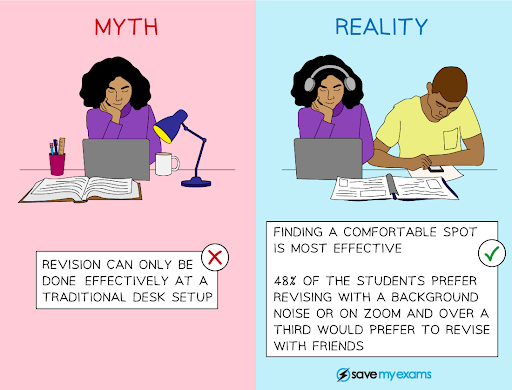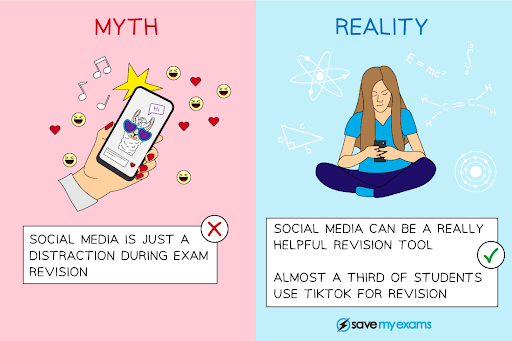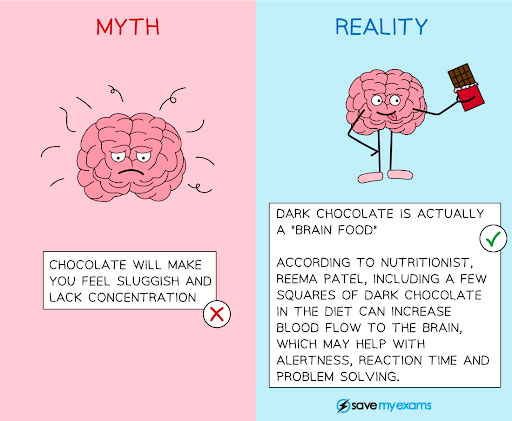Common Revision Myths (And What To Do Instead)
Written by: Emma Dow
Reviewed by: Holly Barrow
Published
Contents
- 1. Key Takeaways
- 2. Myth 1 — "Parents Know Best When It Comes to Revising"
- 3. Myth 2 — "You're Not Expected to Revise Over Christmas"
- 4. Myth 3 — "Revision Can Only Be Done Effectively With a Traditional Desk Setup"
- 5. Myth 4 — "Social Media Is Just a Distraction During Exam Revision"
- 6. Myth 5 — "Chocolate Will Make You Feel Sluggish and Lack Concentration"
- 7. What Actually Works: Evidence-Backed Revision Habits
- 8. Myths Busted
You've probably heard a million different opinions about how to revise. Your parents swear by one method, your friends use another, and the Internet is full of lots of other ideas. It's hard to try and figure out what actually works.
Unfortunately, a lot of the revision advice floating around is outdated, unproven, or just plain wrong. That’s why we surveyed 1,000 parents and teenagers - to understand what revision habits students are actually using and where misconceptions might be holding them back.
This guide will debunk the most common revision myths and show you what cognitive science actually says works. Let's separate fact from fiction and get you revising smarter, not harder.
Key Takeaways
Your parents' revision methods might not suit your learning style or today's exam formats.
Strategic revision during Christmas can prevent last-minute panic before exams.
You can revise effectively anywhere, not just at a traditional desk.
Social media can be a powerful revision tool when used correctly.
Dark chocolate can boost your concentration and exam performance.
Evidence-based techniques like spaced repetition and active recall are proven to work better than passive reading.
Myth 1 — "Parents Know Best When It Comes to Revising"

Myth vs Reality: Your parents love you and want you to succeed. But the way they revised for exams is probably very different from what works today.
In our survey of 1,000 parents, one in two (52%) admitted that they often don’t understand the questions their teenagers are asking them when doing homework.
Exam formats, teaching methods, and our understanding of how the brain learns have evolved. Psychology Today (opens in a new tab) explains how the passive learning techniques that your parents may have used - reading notes and textbooks - feel productive, but don’t consolidate understanding.
What To Do Instead: Have an honest conversation with your parents about the revision techniques you’re using. You might use:
Mind mapping
Mini quizzes
Flashcards
Online revision groups
Practice testing
Trust yourself to find what works for your brain. You know your subjects, your exam formats, and your learning style better than anyone else.
Myth 2 — "You're Not Expected to Revise Over Christmas"

Myth vs Reality: Christmas break feels like the perfect time to completely switch off from school. However, your parents might not fully agree, with 32% expecting their teenagers to revise either on Christmas Eve, Christmas Day or Boxing Day.
Light revision during the festive break could be beneficial. (opens in a new tab)As part of a spaced repetition schedule, some strategic study sessions can lead to better long-term retention, rather than cramming everything in at the last minute.
What To Do Instead: Plan for balanced revision during the holidays. This doesn't mean studying eight hours a day on Christmas Day.
Try dedicating just 30-60 minutes a day to active revision on most days of the break. The key is consistency, not intensity. Short, regular study sessions will keep your knowledge fresh without ruining your holiday.
Myth 3 — "Revision Can Only Be Done Effectively With a Traditional Desk Setup"

Myth vs Reality: There's a persistent image of the "proper" way to study: sitting upright at a tidy desk, textbooks open, highlighters arranged by colour. If you don't have this setup, you might feel like you can't revise effectively.
However, 48% of the teenagers we surveyed prefer revising with a background noise or on Zoom. And, over a third would prefer to revise with friends.
What To Do Instead: (opens in a new tab)UCAS states that being comfortable (opens in a new tab) is one of the most important factors in your study environment being productive. Some students work better at a desk. Others think more clearly at the kitchen table, or even in a café. There's no one-size-fits-all approach.
Experiment with different study locations and find what helps you focus. Maybe you revise Chemistry at your desk but prefer doing English literature analysis curled up in an armchair.
Just make sure your chosen spot doesn't make you too sleepy. Studying on your bed is generally a no-go. Eager for inspiration? Our guide to creating the perfect study space is sure to help.
Myth 4 — "Social Media Is Just a Distraction During Exam Revision"

Myth vs Reality: You've probably been told a thousand times to delete Instagram, avoid TikTok, and stay off social media entirely during exam season. Social media equals distraction, right? However, almost a third of students use TikTok for revision.
Social media can be distracting if you're scrolling mindlessly through your feed when you should be studying. But blanket bans ignore the genuinely useful revision communities and resources available online.
What To Do Instead: Educational content on platforms like TikTok and Instagram has exploded in popularity, with teachers and students sharing:
Quick revision tips
Subject-specific content
Study motivation
Revision hashtags, study groups, and educational accounts can provide support and alternative explanations for tricky topics.
During your revision time, use social media strategically. Follow accounts specifically focused on your exam subjects or study techniques, and set time limits using built-in app controls to prevent endless scrolling.
Myth 5 — "Chocolate Will Make You Feel Sluggish and Lack Concentration"

Myth vs Reality: We've all heard that sugar crashes will ruin your focus. And, approximately 80% of parents and 60% of students think chocolate will not provide brainpower.
However, according to nutritionist Reema Patel (opens in a new tab), dark chocolate can boost mood and concentration. Including a few squares of dark chocolate in the diet can increase blood flow to the brain, which may help with alertness, reaction time and problem-solving.
The key words here are dark chocolate. Milk chocolate loaded with sugar might cause energy spikes and crashes. But quality dark chocolate (70% cocoa or higher) offers genuine benefits.
What To Do Instead: Keep a small stash of dark chocolate available during revision sessions. A few squares can provide a quick mood boost and satisfy cravings without overwhelming you with sugar.
Pair your chocolate with other brain-friendly snacks like nuts, fruits, or wholegrain crackers for balanced energy. And, don’t forget to stay hydrated with plenty of water.
What Actually Works: Evidence-Backed Revision Habits
Now that we've busted the myths, let's focus on what can supercharge effective revision.
Technique | What it is and how to apply it | Why it works |
|---|---|---|
Reviewing material at gradually increasing intervals. Review today → in 3 days → in 1 week → in 2 weeks | PubMed Central states (opens in a new tab) that spaced repetition strengthens memory pathways and boosts long-term retention. | |
Retrieving information without looking at notes. Close your book and write or say what you remember. | Science Direct (opens in a new tab) explores how the effort to recall builds stronger memory. | |
Testing yourself regularly on material. Use flashcards, quizzes, or get someone to test you. | Retrieval practice highlights misconceptions (opens in a new tab) and can help learning stick. | |
Practicing with real exam papers. Use a mark scheme to check what examiners want. | Shows expectations, formats, timing, and how to apply knowledge. | |
Mixing subjects/topics in a study session. Rotate (e.g., 40 mins Bio → 40 mins Chem → 40 mins Physics) | Strengthens memory and promotes deeper understanding (opens in a new tab). |
Myths Busted
Revision doesn't have to be a mystery. By letting go of unhelpful myths and implementing evidence-based study techniques, you'll revise more efficiently and feel more confident heading into your exams.
And Save My Exams is with you every step of the way. Our revision resources are written by real examiners and expert teachers, and designed to match your exact exam board. Whether you're studying for GCSEs, IGCSEs, A Levels, IB, or AP, you'll find clear, exam-focused tools that make revision simpler and smarter.
Explore Save My Exams bank of revision tips.
Revision
Psychology Today - Fighting the Passive Learning Trap (opens in a new tab)
UCAS - How your surroundings affect the way you study (opens in a new tab)
Patient - 7 cacao benefits: is raw chocolate best? (opens in a new tab)
PubMed Central - Evidence of the Spacing Effect and Influences on Perceptions of Learning and Science Curricula (opens in a new tab)
ScienceDirect - Active recall strategies associated with academic achievement in young adults: A systematic review (opens in a new tab)
Education Endowment Foundation - Guest Blog: Retrieval practice – A common good or just commonplace? (opens in a new tab)
BERA - A systematic review of interleaving as a concept learning strategy (opens in a new tab)
Sign up for articles sent directly to your inbox
Receive news, articles and guides directly from our team of experts.

Share this article
 written revision resources that improve your
written revision resources that improve your